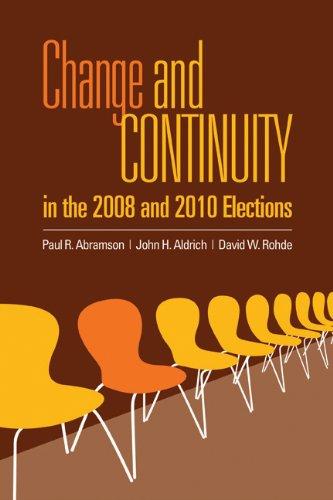 13.0%OFF
13.0%OFF

Download App
 13.0%OFF
13.0%OFF
Change and Continuity in the 2008 and 2010 Elections
-
ISBN
:
9781608717989
-
Publisher
:
CQ Press College
-
Subject
:
Others
-
Binding
:
PAPERBACK
-
Pages
:
504
-
Year
:
2011
₹
750.0
 13.0% OFF
13.0% OFF
₹
652.0
Buy Now
Shipping charges are applicable for books below Rs. 101.0
View DetailsEstimated Shipping Time : 5-7 Business Days
View Details-
Description
In this era of electoral volatility and deep public divide, the mood and results of the 2008 and 2010 elections could not have been more different. How do the lessons drawn from the 2008 elections apply to 2010? In careful analysis of both contests, the authors examine the midterm election results and then turn to their analysis of the National Election Study surveys, while making sure to incorporate and discuss the most recent literature. Updates to this edition include coverage of:* the difference between the 2008 and 2010 electorates;* the dominance of the economy in both races and their outcomes;* the impact of unified party government on nationalizing elections;* the virtual elimination of cross-pressured congressional districts;* the magnitude of campaign spending and its consequences;* the role of the Tea Party movement; and* the outlook for the 2012 elections and likely presidential candidates.As with all books in the Change and Continuity series, the authors present election data in a straightforward, accessible manner with an array of thorough, yet student-friendly graphics.
-
Author Biography
Paul R. Abramson is professor of political science at Michigan State University. He is coauthor of Value Change in Global Perspective (1995) and author of Political Attitudes in America (1983), The Political Socialization of Black Americans (1977), and Generational Change in American Politics (1975). Along with John H. Aldrich and David W. Rohde he is coauthor of thirteen additional books on presidential and congressional elections published by CQ Press.John H. Aldrich is Pfizer-Pratt University Professor of Political Science at Duke University. He is author of Why Parties? (1995) and Before the Convention (1980). He is a past president of both the Southern Political Science Association and the Midwest Political Science Association. In 2001 he was elected a fellow in the American Academy of Arts and Sciences.David W. Rohde is professor of political science and director of the Political Institutions and Public Choice Program at Duke University. He is author of Parties and Leaders in the Postreform House (1991), coeditor of Home Style and Washington Work (1989), and coauthor of Supreme Court Decision Making (1976).












 652.0
652.0







